Prebiotics are compounds in food that help the beneficial bacteria of the intestine grow and do their job of breaking down and absorbing food better. Essentially, they feed the kinds of organisms that probiotics are rich in (1).
Probiotics, are tiny, living organisms that are often found in fermented foods, helping your body and digestive system function at optimal capacity (2). Below you’ll find the best prebiotic supplements on the market, backed by our expert health panel.
Rankings
1. 1MD PrebioMD
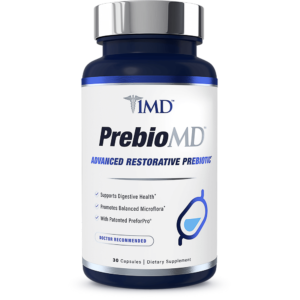
1MD PrebioMD tops our list for providing one of the most groundbreaking prebiotic formulas on the market. It contains a variety of powerful ingredients, including the patented PreforPro, which encourages healthy digestion and gut flora.
Doctor approved, this formula also comes with a special time release capsule, designed to protect the prebiotic fiber from your stomach acid and release it directly in your intestines. PrebioMD capsules are 100% vegetarian and free of unnecessary fillers. Without a doubt, Healthtrends #1 prebiotic choice.
2. 1MD Complete Probiotic and Prebiotic Fiber
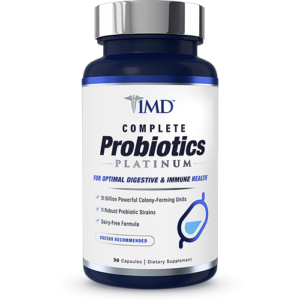
1MD’s Probiotics platinum is a doctor-formulated blend of 11 strains of probiotics along side prebiotic fiber for digestive health. The delayed-release capsules help ensure the probiotics and prebiotic fiber make it past your stomach acid and to your intestines, where they do the most good for your body.
With a whopping 51 billion colony-forming units, or CFUs, per capsule, 1MD probiotics platinum capsules deliver incredible benefits to your gut health.
3. Performance Lab Prebiotic

Performance Lab Prebiotics are made with Inulin-FOS, which supports and nourishes bifidobacterium. When bifidobacterium ferments Inulin-FOS, it produces lactic acid. This reduces gut pH, which inhibits the growth of pathogens and bad bacteria while simultaneously working to protect the immune system.
Performance Lab Prebiotic delivers a powerful, natural blend of prebiotic fiber that helps regulate appetite and nutrient absorption. By enhancing calcium, magnesium, and iron absorption, it can help protect against bone loss and anemia.
4. Garden of Life Dr. Formulated Organic Prebiotic Superfood Fiber

While it doesn’t come with probiotics, Garden of Life Prebiotic Superfood Fiber is an extremely effective option for those looking for a quality daily prebiotic to feed your healthy gut bacteria.The Garden of Life Prebiotic Fiber is made from organic acacia, organic baobab fruit, and other organic fruit materials.
It’s also vegan, USDA-certified organic, non-GMO project verified, gluten-free, dairy-free, sugar-free, and kosher for anyone with dietary restrictions due to allergies, sensitivities, or religious practices.
5. Hyperbiotics Organic Prebiotic Powder

Hyperbiotics is a plant-based prebiotic powder that’s loaded with Inulin-FOS, soluble dietary fiber, and resistant starch. Made from organic acacia fiber, organic green banana flour, and organic Jerusalem artichoke fiber, it is free of synthetic ingredients.
While Hyperbiotics does not contain wheat, gluten, eggs, nuts, shellfish, soy, or dairy, it is made in a facility that may handle these ingredients. For individuals with severe food sensitivities, allergies, or Celiac disease, this might not be the best option.
6. InnovixLabs Broad Spectrum Prebiotic
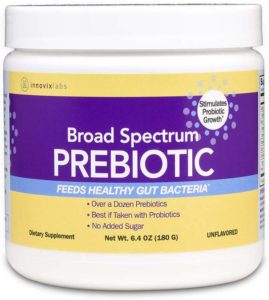
InnovixLabs Broad Spectrum Prebiotic, provides users with resistant starches, soluble fibers and polyphenols, and non-starch polysaccharides. InnovixLabs is third-party tested and certified gluten-free.
It’s also made without tree nuts, eggs, dairy, wheat, soy, GMOs, sugar, artificial colors, peanuts, artificial flavors, or shellfish. While it lacks the organic label of some of our higher-ranking products, it’s also a relatively inexpensive prebiotic that packs a lot of power into each serving.
7. Bulletproof InnerFuel Prebiotic
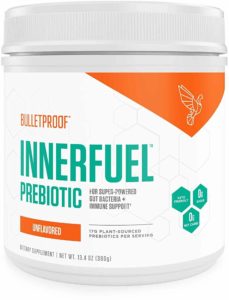
Bulletproof Innerfuel Prebiotic powder is easy to mix into beverages, thanks to a smooth texture and excellent taste. It also comes with powerful immune system support in the form of larch arabinogalactan, which is extracted from the heartwood and bark of the larch tree.
This not only provides plant-based fiber and prebiotic support, but it also contains polyphenols, which fight free-radicals and help boost your immune system. With zero grams of sugar and zero carbohydrates, it also helps protect you from blood sugar spikes.
8. Ora Prebiotic Blend
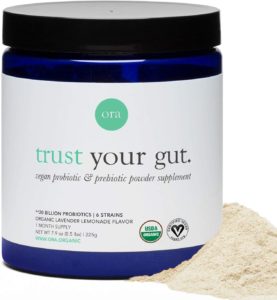
Combined with 6 different probiotic strains, Ora provides another plant-based source of fiber and prebiotics.
As with the other choices on the list, it supports healthy digestion and can help you reach or maintain a healthy weight.
9. Align Dual Biotic
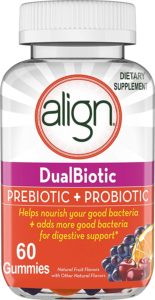
Align Dual Biotic combines probiotics and prebiotics in a delicious gummy formula for complete microbiome therapy.
It only provides Inulin and Bacillus Coagulans, which is nowhere near the quality and breadth demonstrated by other products on this list.
10. Solimo Probiotic + Prebiotic Gummies
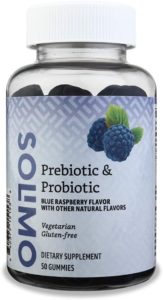
Solimo delivers a healthy serving of Inulin for a fraction of the cost of many of our other choices.
However, it is not a broad-spectrum or complete source of prebiotics, and it is unclear how many of the probiotics survive the journey past the stomach’s acids.
How We Rank
First, we looked at the formulation of the product. Here, we were looking for products that were prebiotic supplements, not probiotic, which is a common mix up. Anything that didn’t contain probiotics, was immediately axed. Leading off this, we analyzed the ingredients of each supplement. Products that contained multiple sources of prebiotic fibers, like our top picks Garden of Life and Performance Lab, were rewarded. Companies that only provided a single prebiotic fiber did not make the list, despite they quality or popularity they may have. We also chose to omit supplements that contained artificial flavors, dyes and fillers as these were simply unnecessary additions.
Next we looked at price per serving. Some more expensive options scored higher on our list due to their overall quality, but the ranking of products of comparable quality ultimately came down to price.
Lastly we looked at the quality of the remaining supplements. If it’s organic, contains additional probiotics, and is free of allergens, it scored higher overall. The 1MD Complete Probiotic and Prebiotic Fiber took second place because it packed both probiotics and prebiotics into an extended-release capsule. 1MD PrebioMD provided the most comprehensive prebtioc formula on the market, with patented ingredients to maximize results. Doctor backed and free of an unnecessary ingredients, it’s no surprise it took the top spot.
Benefits
1. Prebiotics improve digestive health. The largest and most often-touted benefit of prebiotics is that they help your digestive system do its daily work. Prebiotics help the healthy, beneficial bacteria that live in your gut grow and flourish.
This balances out any toxins, bad bacteria, or unhelpful microorganisms that may be living down there as well. It’s really simple: research directly shows that prebiotic intake increases the population of healthy intestinal microflora to improve digestive health (3).
The result is that your body processes food and even toxins at maximal capacity, getting as many of the good nutrients as possible while expelling as many bad ingredients as it can.
This is also the root cause that you can thank for many of prebiotics’ other benefits. As it turns out, gut health is important not just for your belly, but for many of your body’s other physiological systems and functions.
2. Prebiotics can help treat chronic digestive conditions. Chronic disorders of the gut like ulcerative colitis or Crohn’s disease, as well as any kind of digestive inflammation or infection, aren’t just annoying, they can have a profound impact on the way you live your life, as well as lead to other health risks and complications.
Such conditions impact the food you eat, whether or not you’re able to drink, even whether some social situations, like going out to dinner or grabbing drinks after work with coworkers, are available to you. A 2012 study published in the Journal of Nutrition showed that prebiotics have such a huge impact on the body that they can actually help relieve some of the symptoms of such diseases (4).
Another 2007 study demonstrated that prebiotics with a lot of fiber in them help stabilize your gut, reducing the risk of such chronic conditions as well as their severity (5).
3. Prebiotics can help with diarrhea. Not only are prebiotics a wonder-food for those who suffer from chronic conditions like ulcerative colitis, but they can also help the average person who experiences a bad bout of diarrhea after eating something that their stomach doesn’t agree with. Numerous studies show that both prebiotics and their close cousin, probiotics, have positive effects when used to treat diarrhea (6).
Even among reviews and studies that don’t have conclusive findings, prebiotics are marked as a promising method for both avoiding diarrhea in the first place and for preventing it from happening again (7).
Further research is needed, however, to figure out the best timing and dosage for using prebiotics to combat diarrhea.
4. Prebiotics may help with stress and mental health. In recent years, one of the hottest topics in research has been the connection between gut function and mental health (8).
Having a healthy, well-functioning digestive system is starting to look more and more like a factor in having an equally healthy mind, with both depression and anxiety being linked to inflammation in the gut in some cases (9).
A 2015 study showed that when probiotics were administered to healthy patients, prebiotic supplements were shown to reduce the body’s production of cortisol (10).
Cortisol is a natural response that’s developed as a part of our fight-or-flight systems, but it can have negative effects on mental health (11).
If prebiotics can help lower cortisol levels and prevent stress, they may have a role to play in combating stress-related mental health disorders like anxiety. Well-balanced gut flora can also improve the length and quality of sleep, which allows people to manage the symptoms of stress better.
5. Prebiotics may reduce the risk of cancer. A 2010 review published in The British Journal of Nutrition showed that there is a reduction in the numbers of tumors and cancers in those who have a diet rich in prebiotics (12).
Of course, this applies mainly to cancers of the digestive system and its related areas, like colon cancer. Eating prebiotics is certainly good for your health, but it may not necessarily help with, say, skin cancer.
Despite the fact that more research is needed, some studies have shown that prebiotics may even be able to prevent human colorectal cancer, not merely alleviate the symptoms or the severity. Eating a diet rich in prebiotics may be one of the best ways to avoid getting cancer in the first place (13, 14).
6. Prebiotics can help prevent obesity. Prebiotics can legitimately impact your diet in a positive way, keeping you healthy and lowering unnecessary or unhealthy levels of fat in the body. In regards to weight, prebiotics have the potential for, essentially, two different functions.
On the one hand, a 2015 study showed that prebiotics might help you maintain a healthy body weight (15).
Because they’re rich in fiber, your body will feel full faster, with a much smaller amount of carbs, calories, trans fats, and other unhealthy things you might be taking in through your food. In general, diets rich in fiber are good for both obesity and diabetes mellitus — meaning a diet rich in prebiotics likely is as well (16).
The other way it combats obesities is due to the effects that prebiotics have on your gut microflora. Prebiotics might impact the way your body processes food, helping to keep you leaner and more muscular. In one study, the usage of prebiotics significantly decreased obesity in a population of overweight children (17).
7. Prebiotics may help with eczema and other skin conditions. When children or babies develop eczema, the parents are often given a prescription for probiotic or prebiotic supplements or baby food.
While there is weak evidence that probiotic usage helps eczema directly, further research is required on the effects of prebiotics (18). For the meantime, it seems safe to assume that prebiotics may have a marginal beneficial impact on eczema development in children.
8. Prebiotics can benefit your cardiovascular system. Manydiets which are rich in fiber, and thus prebiotics, are proven to be beneficial for cholesterol levels (19).
There’s plenty of evidence to suggest that fiber-rich foods, like prebiotics, are even helpful across a wide range of cardiovascular disease and conditions, not just ADL cholesterol (20).
9. Prebiotics can benefit bone health and help prevent fractures. Regular consumption of prebiotics can actually improve how healthy your bones are, leading to fewer breaks, fractures and other issues with your skeletal system. Since prebiotics increase the efficacy of your dietary system, feeding the microorganisms that help it flourish, a diet rich in prebiotics also increases your body’s uptake of essential nutrients and minerals, like calcium, iron or magnesium (21).
Such research suggests prebiotics aren’t just good for preventing fractures. They may also help with fighting against chronic bone conditions like osteoporosis.
With more calcium absorption, prebiotics may aid in increasing or maintaining bone density, especially in people over 50.
10. Prebiotics may help regulate blood sugar and may even help prevent the development or worsening of Type II Diabetes. Inulin, in particular, may help reduce levels of systemic inflammation, prevent blood sugar spikes, and help stabilize blood sugar levels throughout the day (23).
The twin benefits of preventing blood sugar spikes and encouraging a sense of fullness can work in tandem to promote a healthy weight and fight diabetes.
Preventing blood sugar spikes can also help stabilize your mood and improve brain functioning. By boosting the health of your gut, prebiotics can also enhance your body’s ability to absorb nutrients from food.
Improved gut health has marked effects on brain function, mood, sleep, and stress management. In this way, the many benefits of prebiotics work hand-in-hand to help optimize your health.
Side Effects
1. Prebiotics and their close cousin, probiotics, may worsen the gas and bloating you seek them out for. Even though a diet rich in fiber is almost always a good choice, for some users it could actually make it harder to pass stools or solve underlying digestive issues by increasing gas and bloating.
Of course, this is only a subset of users. In most trials, prebiotics are shown to have positive effects on such digestive discomfort.
However, this possible side effect is still good to keep in the back of your head just in case. If you begin taking prebiotics and you actually notice that your symptoms are starting to worsen in a serious and noticeable way, then it may be worth it to put prebiotics on hold until you can talk to your doctor about it it.
Another factor to consider is that sometimes these symptoms can become worse in the first week, as your body adjusts to the new prebiotic and probiotic balance in your gut. In many cases, these side effects subside with time.
2. There may be side effects not yet fully understood by scientists. According to a 2018 study in Annals of Internal Medicine, scientists found that health risks, adverse effects, and bad side effects often aren’t really reported in clinical and animal trials concerning prebiotics and probiotics (24).
They’re both relatively new approaches to understanding and trying to aid human gut health, so the adverse risks haven’t necessarily been ironed out yet.
3. While prebiotics certainly increase the amount of microflora living in your gut, they may not necessarily help with the diversity of said bacteria the same way that probiotics do (25). Whether that’s a good or bad thing remains to be seen. That said, prebiotics aren’t a normal “drug” like antibiotics or retroviral medications.
Though supplements may come in pill form, they’re mostly just fiber, which is totally a natural component of a regular diet. That means that overall, you can expect fewer complications from prebiotics than you might a typical medication or a more contentious supplement.
Recommended Dosage
Unfortunately, prebiotics are a relatively new addition to the world of internal medicine and gut health (26).
While it’s great that such an innovative approach is being researched and is now relatively available to the public, it also means that there’s not that much information out there on dosing and how much a given person should take per day. There is no consensus among the available scientific evidence about what works best for most people.
That said, there are some general guidelines one can follow when introducing any new supplement to one’s diet.
It’s probably better to begin with a small amount, no more than 1 or 2 grams a day, for at least a week or two. After that, users can begin adding more and more in small amounts, monitoring carefully how their body is reacting to the new dietary changes.
In today’s modern society, it’s challenging to meet the prebiotic requirements in most foods. Your body needs prebiotics and fiber, but prebiotics and fiber might also feel a bit unfamiliar.
Respect your body’s pace as you adjust to adding more of these fibers and prebiotic materials back into your diet. It will likely prove beneficial; however, do not hesitate to seek medical supervision as you make changes to your supplement regimen.
FAQ
Are prebiotics safe to use? Yes, as mentioned earlier in this article, prebiotics haven’t been fully researched in terms of adverse side effects. That being said, there are no reports of people dying or suffering from health problems due to a diet high in prebiotics. If you’re worried about it, you can simply try adding prebiotics into your diet on a slow, steady basis – monitoring any significant changes in your body.
Are prebiotics safe for pregnant women? Again, yes. There are no recorded health issues associated with taking prebiotics or eating fiber-rich foods while you’re pregnant. Of course, adhering to a good diet for your pregnancy in all respects is still necessary. You can’t simply take prebiotics and expect they’ll fill in any gaps caused by malnutrition. However, as long as you’re taking prebiotics in addition to an otherwise healthy diet, and you’re taking them in reasonable amounts, there’s no reason it should affect your pregnancy.
What foods are rich in prebiotics? Prebiotics are everywhere. Chances are, you’re probably even getting some in your normal diet. However, if you want to load up on them, some foods you can look out for are Chicory root, dandelion greens, garlic, leeks, onions, and bananas. If you’re having a hard time remembering specific foods with prebiotic content, just think about it: prebiotics are often rich in fiber. So if you’re eating foods that are known for being full of healthy fiber, like asparagus, you’re probably getting some prebiotics along with it.
Are prebiotic supplements an option? Of course, you might not be the kind of person who wants to get your prebiotics from your food. Maybe you don’t have the time nor the inclination to purchase that much fresh produce on a regular basis. If that’s the case, you don’t have to worry, there are plenty of prebiotic supplements available to consumers who want them.
Are prebiotics the same thing as probiotics? No, probiotics are foods or supplements loaded with good bacteria, the kind that your gut needs to function healthily. Prebiotics are foods high in fiber, which are good for feeding the microorganisms that already exist in your gut. It’s a subtle but important difference.
Prebiotics are the fertilizer of probiotics. In the same way that different types of plants thrive in different soil, different types of probiotics need different types of prebiotics in order to be properly fed and remain in good health. That’s why it’s important to seek out a broad spectrum of prebiotic sources, whether in your supplement regimen or your diet.
Can I take prebiotics and probiotics at the same time? Yes. Probiotics and prebiotics do different things. In fact, there’s even a category of product that offers probiotics and prebiotics in the same package. They’re called synbiotics. That said, prebiotics and probiotics are both supplements that affect your digestive system, so it may not be wise to take a huge dosage of both simultaneously, or to very suddenly start taking a high dosage of one while already taking the other. In simultaneous use cases, gradually and carefully upping your dose is likely the best bet.
Do prebiotics interact with drugs? In some cases, yes, though it may not be in specifically the way you’re thinking. For example, prebiotics can help with diarrhea or stomach upset caused by antibiotics (25). Because the side effects of prebiotics aren’t particularly well-researched, however, it may be worth it to ask your doctor before taking them if you’re already on another course of medicine.
Can I drink alcohol while taking prebiotics? Yes, alcohol and prebiotics don’t really have any interactions to speak of. Drinking (a moderate amount) while also taking prebiotics (in moderation) is completely safe.
Where do prebiotics come from? There are a wide variety of prebiotics on the market, so it can be hard to pin down exactly where they come from. That said, if you buy a bottle of prebiotic supplements, it’ll most likely say where the root source is. In general, prebiotics are either totally naturally or synthetically manufactured. You could find inulin, for example, in asparagus, or you could find it in processed ingredients like chicory root extract, or in a processed form such as oligofructose.
Is raw apple cider vinegar a prebiotic? Yes, apple cider vinegar is a prebiotic, which feeds probiotics (the healthy microflora in your inner ecosystem).
Are prebiotics better than probiotics? Neither is better or worse as they both complement each other in managing the gut bacteria in the body. Prebiotics feed the probiotics in your gut and help them thrive properly in their environment.
Do prebiotics help with weight loss? Yes, prebiotics can help with weight loss by promoting a healthy gut flora while also increasing satiety. There is also a strong connection between gut bacteria and obesity. By balancing you gut bacteria you can help increase thermogenesis and decrease appetite, both which support weight loss.
Is Metamucil a prebiotic? While psyllium is not considered a prebiotic it is considered to have prebiotic effects. Psyllium is somewhat resistant to fermentation, however, a small portion of psyllium fibers can be fermented by intestinal bacteria.
How do prebiotics work? A prebiotic is a special type of soluble fiber that is used mostly by the beneficial good bacteria as a fuel. These good bacteria, in turn, produce certain substances that acidify the colon (a very good thing) and serve as a nutrition source for the colon’s own cells.
What is the difference between prebiotics, probiotics, and postbiotics? Some brands offer a combination of pre-, pro-, and postbiotics. The science is not yet clear as to why postbiotics work so well in combination with prebiotics, but there is evidence that the three can promote gut health and work as a powerful anti-inflammatory agent (27).
Postbiotics include metabolites such as enzymes, vitamins, fulvic acid, and fatty acids, which help with absorption. Postbiotics can be added to some brands, or they occur as the result of natural fermentation.
Are prebiotics safe for kids? Unfortunately there is no conclusive research to say whether or not prebiotics are safe for kids to consume. Within the next 3-5 years we should have enough research to determine if prebiotics are safe for children and the correct doses they should be taking for each type of prebiotic.
Recap
Prebiotics are fiber-rich foods or supplements that help the microorganisms in your digestive system grow and flourish. By doing so, prebiotics improve your digestive health and may have a much wider positive impact, improving cardiovascular health, reducing your risk for cancer and decreasing stress.
As of now, there aren’t any major side effects reported from prebiotic usage, but more research is required. In any case, prebiotic diets seem linked to a wide variety of health benefits and they could be a great option for those seeking better digestive health.
For Healthtrends #1 recommended prebiotic supplement, click here.
